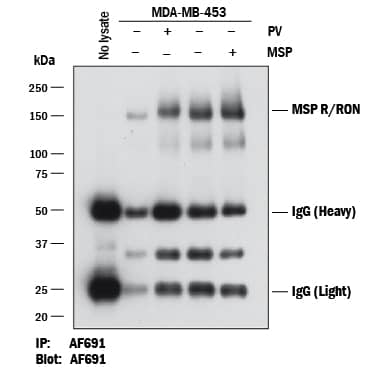Human MSPR/Ron Antibody
R&D Systems, part of Bio-Techne | Catalog # AF691


Key Product Details
Validated by
Species Reactivity
Validated:
Cited:
Applications
Validated:
Cited:
Label
Antibody Source
Product Specifications
Immunogen
Glu25-Ser956
Accession # CAA49634
Specificity
Clonality
Host
Isotype
Endotoxin Level
Scientific Data Images for Human MSPR/Ron Antibody
Detection of Human MSP R/Ron by Western Blot.
Western blot shows lysates of MDA-MB-468 human breast cancer cell line untreated (-) or treated (+) with 100 uM Pervanadate (PV) for 10 minutes or 100 ng/mL Recombinant Human MSP/MST1 Protein (Catalog # 352-MS) for 10 minutes. PVDF membrane was probed with 0.2 µg/mL of Goat Anti-Human MSP R/Ron Antigen Affinity-purified Polyclonal Antibody (Catalog # AF691) followed by HRP-conjugated Anti-Goat IgG Secondary Antibody (Catalog # HAF017). A specific band was detected for MSP R/Ron at approximately 150-160 kDa (as indicated). This experiment was conducted under reducing conditions and using Immunoblot Buffer Group 1.Detection of Human MSP R/Ron by Immunoprecipitation.
Human MSP R/Ron was immunoprecipitated from 1 mg of lysates of MDA-MB-468 human breast cancer cell line untreated (-) or treated (+) with 100 uM Pervanadate (PV) for 10 minutes or 100 ng/mL Recombinant Human MSP/MST1 Protein (Catalog # 352-MS) for 10 minutes. MSP R/Ron was immunoprecipiated with 1 ug Goat Anti-Human MSP R/Ron Antigen Affinity-purified Polyclonal Antibody (Catalog # AF691). The MSP R/Ron-antibody complexes were absorbed using Protein G Sepharose. Immunoprecipitated MSP R/Ron was detected by Western blot using 0.2 µg/mL of Goat Anti-Human MSP R/Ron Antigen Affinity-purified Polyclonal Antibody (Catalog # AF691).Applications for Human MSPR/Ron Antibody
Blockade of Receptor-ligand Interaction
Immunoprecipitation
Sample: MDA‑MB‑468 human breast cancer cell line treated with Pervanadate or Recombinant Human MSP/MST1 Protein (Catalog # 352-MS)
Western Blot
Sample: MDA‑MB‑468 human breast cancer cell line treated with Pervanadate or Recombinant Human MSP/MST1 Protein (Catalog # 352-MS)
Formulation, Preparation, and Storage
Purification
Reconstitution
Formulation
Shipping
Stability & Storage
- 12 months from date of receipt, -20 to -70 °C as supplied.
- 1 month, 2 to 8 °C under sterile conditions after reconstitution.
- 6 months, -20 to -70 °C under sterile conditions after reconstitution.
Background: MSPR/Ron
Macrophage stimulating protein receptor (MSP R), encoded by the human Ron and the mouse Stk, is one of a small family of receptor tyrosine kinases (RTKs) that also includes human Met (the receptor for hepatocyte growth factor) and chicken Sea (1, 2). This family of receptors is synthesized as a single-chain precursors that are cleaved into a mature disulfide-linked heterodimers composed of an extracellular alpha chain and a membrane spanning beta chain with intrinsic tyrosine kinase activity. Biologically active ligands (MSP and HGF) for this family of receptors are also disulfide-linked alpha-beta heterodimers. Human MSP R cDNA encodes a 1400 amino acid (aa) residue precursor protein with a 24 aa signal peptide, a 285 aa residue alpha chain (Glu25 - Arg309) and a 1091 aa residue transmembrane beta chain (Gly310 - Thr1400). The extracellular domain of MSP R is comprised of an N-terminal sema domain, a PSI (plexin semaphorins integrins) domain, followed by four immunoglobulin-like folds shared by plexins and transcription factors (3). The soluble sema domain binds MSP and inhibits the MSP R-dependent signaling pathways. MSP receptor is expressed in multiple tissues including specific areas of the central and peripheral nervous systems, epithelial cells along the digestive tract, skin and lung, and in subpopulations of the mononuclear phagocyte lineage (1, 2). Although free MSP alpha or beta chains have been shown to bind MSP R, only the heterodimeric MSP can induce receptor activation and cause biological activity (4, 5). MSP R associates with other transmembrane molecules including integrins, cadherins and other cytokine receptors. Transactivation and signaling crosstalk between MSP R and its associated transmembrane receptors have been demonstrated (6 - 8). Human MSP R shares 72% amino acid sequence identity with mouse MSP R.
References
- Gaudino, G. et al. (1994) EMBO J. 13:3524.
- Wang, M-H. et al. (1994) Science 266:117.
- Angelonis, D. et al. (2004) J. Biol. Chem. 279:3726.
- Wang, M-H. et al. (1997) J. Biol. Chem. 272:16999.
- Danilkovitch, A. et al. (1999) J. Biol. Chem. 274:29937.
- Danilkovitch-Miagkova, A. et al. (2000) J. Biol. Chem. 275:14783.
- Danilkovitch-Miagkova, A. and A. Leonard (2001) Histol. Histopathol. 16:623.
- Santora, M. et al. (2003) Devel. Cell 2:257.
Long Name
Alternate Names
Gene Symbol
UniProt
Additional MSPR/Ron Products
Product Documents for Human MSPR/Ron Antibody
Product Specific Notices for Human MSPR/Ron Antibody
For research use only
